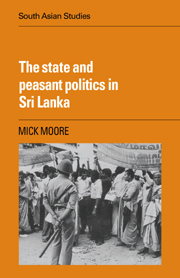Book contents
- Frontmatter
- Contents
- List of maps
- List of tables
- Acknowledgments
- Glossary of Sri Lankan terms
- Maps
- 1 Puzzles and agendas
- 2 Methods, scope and elaborations
- 3 Crown lands
- 4 Land reform
- 5 Pricing and agricultural services
- 6 Categorising space: urban–rural and core–periphery
- 7 A smallholder interest or smallholder interests?
- 8 Rural consciousness
- 9 Ethnic conflict and the politics of the periphery
- 10 The Sri Lankan polity
- 11 Concluding remarks
- Appendix 1 Results of general elections, 1947–77: percentage of parliamentary seats won
- Appendix 2 The myth of the plantation impact on the Sinhalese village: two accounts
- Notes
- Bibliography
- Index
- CAMBRIDGE SOUTH ASIAN STUDIES
- Frontmatter
- Contents
- List of maps
- List of tables
- Acknowledgments
- Glossary of Sri Lankan terms
- Maps
- 1 Puzzles and agendas
- 2 Methods, scope and elaborations
- 3 Crown lands
- 4 Land reform
- 5 Pricing and agricultural services
- 6 Categorising space: urban–rural and core–periphery
- 7 A smallholder interest or smallholder interests?
- 8 Rural consciousness
- 9 Ethnic conflict and the politics of the periphery
- 10 The Sri Lankan polity
- 11 Concluding remarks
- Appendix 1 Results of general elections, 1947–77: percentage of parliamentary seats won
- Appendix 2 The myth of the plantation impact on the Sinhalese village: two accounts
- Notes
- Bibliography
- Index
- CAMBRIDGE SOUTH ASIAN STUDIES
Summary
The changing Sri Lankan polity
This book has been concerned with the continuities in Sri Lankan politics over a period of several decades. Nothing has happened in the few years since the arguments presented here began to crystallise to suggest that there has yet been any very marked change in the way in which the farming population relates to the political system. At the same time, it is becoming increasingly clear that the political system itself has undergone very substantial changes in recent years. It is likely that future observers will look back and see 1977 as an important turning-point. The new UNP government elected in 1977 introduced a policy of economic liberalisation and integration into the global capitalist system which has had far-reaching consequences for the economy and, less certainly, for the social structure. And the relationships between the Sri Lankan state and the Jaffna-based Sri Lanka Tamil population, which had been deteriorating slowly in earlier years, took a marked turn for the worse after the widespread attacks on Tamils in August 1977.
Since it has been argued that the way in which smallholders use politics is in large degree shaped by the national political system, the book would be incomplete without some reference to these recent changes in the system. It would be convenient if the nature and direction of changes in the polity were sufficiently clear for one to hazard a few predictions about how they are likely to affect the representation of smallholders' occupational interests.
- Type
- Chapter
- Information
- The State and Peasant Politics in Sri Lanka , pp. 231 - 241Publisher: Cambridge University PressPrint publication year: 1985

